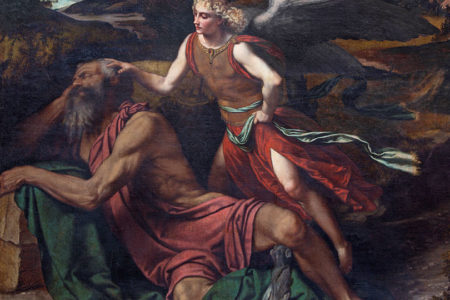Israel’s Evil Kings
The northern kingdom was plagued with evil kings, beginning with Jeroboam (931–910 BC), who intentionally caused Israel to sin by erecting golden calves in Bethel and Dan and telling the Israelites, “Here are your gods, O Israel, which brought you up from the land of Egypt!” (1 Ki. 12:28). Here is a rundown of the reigns of the seven kings who followed him:
♠ Nadab (910–909 BC)
Jeroboam’s son. He practiced all the evils his father practiced. He ruled only two years because Baasha assassinated him and became king in his place (15:25–28).
♠ Baasha (909–886 BC)
He immediately killed everyone in Jeroboam’s house. His despicable deeds caused God to pronounce the same judgment on him, and his household suffered the same fate as Nadab’s (15:28—16:11).
♠ Elah (886–885 BC)
He assassinated Baasha and ruled two years. While in a drunken stupor, Elah was assassinated by Zimri (vv. 12–13).
♠ Zimri (885–885 BC)
He ruled for one week. Hearing that Zimri had become king, the people of Israel made Omri king and attacked Zimri in Tirzah. Knowing he was defeated, Zimri committed suicide by going into the citadel of the king’s house and burning it down upon himself (vv. 15–20).
♠ Omri (885–874 BC)
He proved to be eviler than all the kings before him. He ruled 12 years, died, and was buried in Samaria (vv. 21–28).
♠ Ahab (874–853 BC)
Omri’s son. He followed the examples before him and became even more wicked. His idolatrous wife, Jezebel, was the daughter of Ethbaal, king of the Sidonians. Her marriage to Ahab secured an alliance between Phoenicia and Israel and brought Baal worship to Israel. The driving force behind Baal worship, Jezebel led Ahab to serve Baal and erect a temple and altar to Baal in Samaria (vv. 31–33). When condemned and convicted of his sin by God, Ahab tore his clothes, donned sackcloth, and fasted and mourned in repentance and humility. God showed grace to Ahab, promising not to bring judgment or calamity on his house but vowing to pour them out on Ahab’s son’s house (21:27–29). Ahab died fighting the Syrians, and Ahaziah reigned in his place (22:37–40).
♠ Ahaziah (853–852 BC)
He ruled for two years. He did evil in God’s sight and worshiped Baal, which angered the Almighty (vv. 51–53). Ahaziah fell through the lattice of his upper room on the second floor of his dwelling and received a life-threatening injury. Extremely afraid he would die, he sent messengers three times to seek Baal-Zebub, the god of Ekron (2 Ki. 1:1–2). In so doing, Ahaziah signed his own death warrant. Elijah intercepted the messengers each time. The third time the prophet informed Ahaziah personally that he would surely die. With Ahaziah’s death, Elijah passed off the scene.
Ahaziah had no son to replace him on the throne, so Jehoram (852–841 BC) became king in his stead (vv. 3–18). Ten more kings ruled Israel from 841 to 722 BC—all of them evil.









If you were to write of today, would Trump be in this list?
Hello Brother Levy
Would you tell me if Hosea 6:1-2 can be relied upon with informing us of the timing of the Lords return to the earth after the 7 year tribulation.